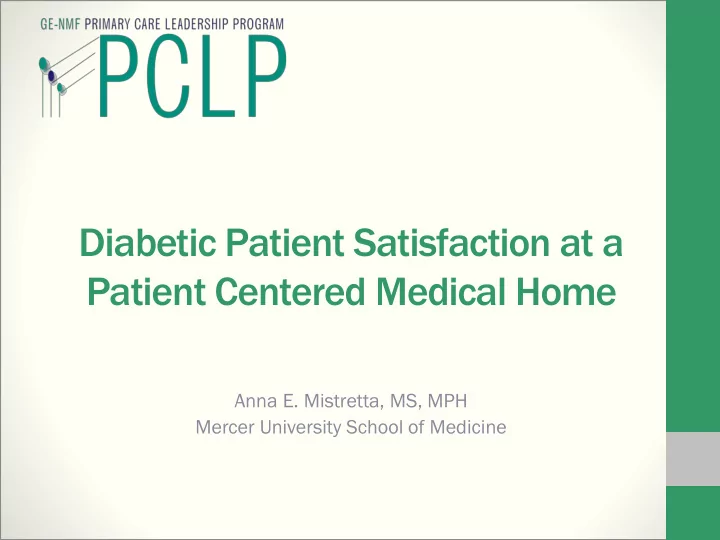

Diabetic Patient Satisfaction at a Patient Centered Medical Home Anna E. Mistretta, MS, MPH Mercer University School of Medicine
Special thanks to…. • The GE Foundation • The National Medical Foundation (NMF) • Dr. Dana Marshall for serving as my project advisor • Will Wyatt, for answering all my questions and serving as site preceptor • D. Lee Wilson, for giving me a place to stay while in Nashville
Background • Physician-patient interview considered key component of all health care • Multi-staff primary care sessions were associated with better patient outcomes • Importance of examining complexity of self-care, patient cultural behaviors, education and beliefs • Examining primary care visits important and critical interaction to examine when evaluating diabetic patient outcomes
Ecological model of health behavior Marrero D G et al. Dia Care 2013;36:463-470
Purpose • To examine diabetic patient satisfaction, education and adherence to self-care recommendations following a visit to a UNHS clinic during a two month period (June 10 – August 5 2013) • Eleven item telephone survey was used to elicit the patient’s responses to the study variables
Survey Administration • Patients called between 10 and 7 CST, unless pt asked for a call-back at another time Patients told: • Goal of survey • Survey confidential • No right or wrong answer • Declining to participate would not affect their clinic care
Demographics • N =113, 54 responses • 35 F vs. 18 M • Age categories: 31-35: 4 36-40: 3 41-45: 2 46-50:4 51-55: 12 56-60: 10 61 +: 19
Survey Results & Findings • 3 Spanish speakers • 8 declined to participate • 10 could not be reached due to defunct number • 47.7 % of inquiries resulted in completed survey • 8/11 questions used 5 scale Likert rating • Overall, most happy to participate, eager to give input about the clinic
Limitations • Brief time period, small n • Ethnicity and race not identified • Almost 10% of patients had contact telephone numbers no longer working, unable to accept calls • Limited ability to observe nonverbal cues, or verify information • Limited by discrete questions queried: little room for individualized input* • Larger number of older patients (61+)
*Some personal comments The good: • Gratitude for Nancy, Katie, and Amy • Liked nutrition counseling • Loved yoga offering The bad: • “Bad experience” at Waverly • Disliked diabetes coordinator • Changed clinics due to dissatisfaction • “Don’t take time” to understand individualized care • Inability to have major health issues related to diabetes addressed
Conclusions The majority of patients: • Would recommend the clinic • Feel they get enough time with the provider • Find the provider trustworthy and helpful • Check and record their blood sugar regularly • Have suffered no diabetic complications since last coming to clinic
Conclusions continued Many patients: • Haven’t changed their diet or exercise significantly (defined as very/extremely on Likert scale) • Expressed confusion about the role and identity of the diabetes coordinator, nutritionist
Recommendations • Reiterate the importance of checking blood sugar and recording values daily • Help patients better define how they can incorporate dietary changes and increase physical activity • Increase presence and role of diabetes coordinator, nutritionist • Encourage patients to make sure they have an active telephone number for follow up calls
• Beck, R., Daughridge, R. & Sloane, P. Physician-patient communication in the References primary care office: A systematic review . Journal rnal Ameri erican an Boar ard of Family Pract ctice. 2002; 15, 25-38. • Ciechanowski P, Katon W, Russo J, & Walker E. The patient-provider relationship: attachment theory and adherence to treatment in diabetes. Ameri erican an Journal rnal of Psychia chiatr try. 2001; 158, 29 – 35. • Marrero, D., Ard, J., Delamater, A., Peragallo-Dittko, V., Mayer-Davis, E., Nwankwo, R., Fisher, E. Twenty-First Century Behavioral Medicine: A Context for Empowering Clinicians and Patients With Diabetes . Diabe abetes es Care. e. 2013; 13; 36, 463-470. 70. • Von Korff M, Gruman J, Schaefer J, Curry S, & Wagner E. Collaborative management of chronic illness. Annal als s of Internal ernal Medicine ne . 1997; 127, 1097 – 1102 . • Wagner, E., Grothaus, M., Sandhu, N., Galvin, M., McGregor, M., Artz, K., & Coleman, E. Chronic care clinics for diabetes in primary care, a system-wide randomized trial , Diabe abetic tic Care. 2001; 24, 695-700.
Recommend
More recommend